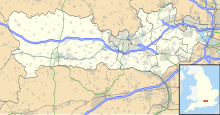Brimpton Pit is a 1.6-hectare (4.0-acre) geological Site of Special Scientific Interest west of Aldermaston in Berkshire.[1][2] It is a Geological Conservation Review site.[3]
| Site of Special Scientific Interest | |
 | |
| Location | Berkshire |
|---|---|
| Grid reference | SU 565 650[1] |
| Coordinates | 51°22′52″N 1°11′24″W / 51.381°N 1.190°W |
| Interest | Geological |
| Area | 1.6 hectares (4.0 acres)[1] |
| Notification | 1984[1] |
| Location map | Magic Map |
This former gravel pit contains fossil molluscs and pollen which were laid down during a warm phase 80,000 years ago which was first recognised at this site, and is called the Brimpton Interstadial (Marine Isotope Stage 5a). The pit is also important for helping to understand the development of the River Thames and its tributaries.[4][5]
A footpath runs along the side of this site, but no geology is visible. The western half is part of a field and the eastern half is a dip in an area of wood and scrub.
References
editWikimedia Commons has media related to Brimpton Pit.
- ^ a b c d "Designated Sites View: Brimpton Pit". Sites of Special Scientific Interest. Natural England. Retrieved 19 November 2019.
- ^ "Map of Brimpton Pit". Sites of Special Scientific Interest. Natural England. Retrieved 19 November 2019.
- ^ "Brimpton Gravel Pit (Quaternary of the Thames)". Geological Conservation Review. Joint Nature Conservation Committee. Retrieved 4 October 2019.
- ^ "Brimpton Pit citation" (PDF). Sites of Special Scientific Interest. Natural England. Retrieved 19 November 2019.
- ^ Stone, P.; et al. "Devensian glaciations, Quaternary, Southern Uplands". Earthwise. British Geological Survey. Retrieved 19 November 2019.
